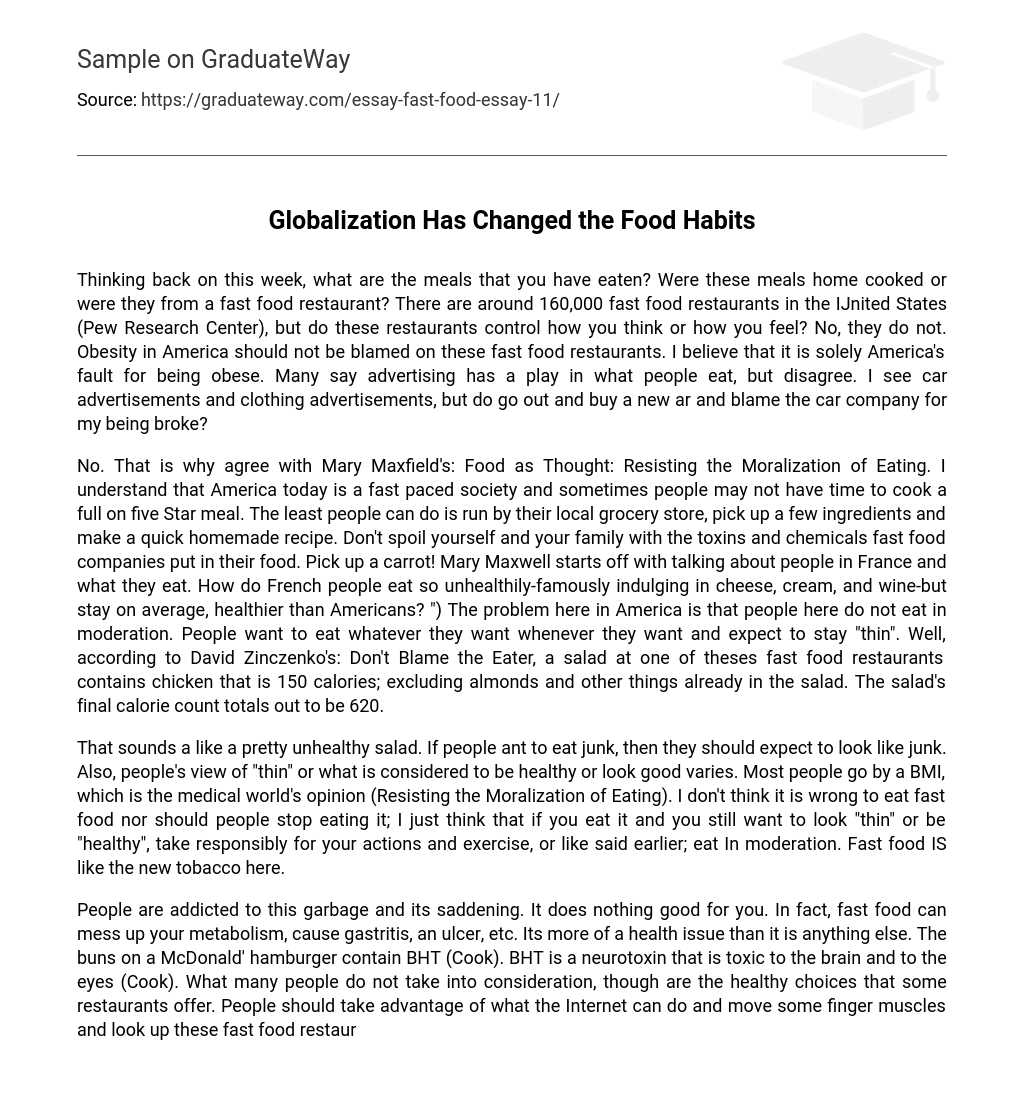Reflecting on this week, I am curious about the meals you have consumed. Were they prepared at home or obtained from a fast food restaurant? It is worth noting that there are approximately 160,000 fast food restaurants in the United States (Pew Research Center). Nevertheless, these establishments do not impact your thoughts or emotions. The blame for obesity in America should not solely be attributed to these fast food restaurants. I firmly believe that America bears responsibility for its own issue of obesity. Many argue that advertising influences individuals’ food choices; however, I disagree. Similarly, I come across advertisements for cars and clothing, yet I do not impulsively purchase a new car and hold the car company accountable for my financial difficulties.
No, I support Mary Maxfield’s perspective as stated in “Food as Thought: Resisting the Moralization of Eating.” While I recognize that individuals in today’s fast-paced American society may lack time for elaborate meal preparation, it is still possible to quickly create a homemade recipe using a few ingredients from a local grocery store rather than resorting to toxin and chemical-filled fast food. Instead of choosing unhealthy fast food options, why not opt for something like a carrot? Mary Maxwell explores the eating habits of the French, known for their indulgence in cheese, cream, and wine. Despite these indulgences, they manage to maintain relatively better health compared to Americans on average. Conversely, the problem in America lies with our lack of moderation when it comes to eating. People here want unrestricted consumption while expecting to remain slim. However, according to David Zinczenko’s article “Don’t Blame the Eater,” even a salad from a fast food restaurant can contain more calories than anticipated. For instance, a chicken salad alone already amounts to 150 calories without factoring in almonds and other ingredients—resulting in a total calorie count of 620.
That sounds like a rather unhealthy salad. If individuals choose to consume junk food, then they should anticipate appearing as such. Additionally, people’s perception of being “thin” or what is deemed as healthy or attractive differs. Many individuals rely on the body mass index (BMI) as an indication, which represents the medical community’s perspective (Resisting the Moralization of Eating). I do not believe it is misguided to indulge in fast food, nor do I believe people should cease consuming it; nonetheless, if one desires to maintain a “thin” physique or achieve good health, they must take accountability for their choices and engage in physical activity, or as previously mentioned, consume in moderation. Fast food is reminiscent of the contemporary version of tobacco.
People are concerned about the negative impact of fast food addiction on their health. Fast food provides no advantages and can actually damage metabolism, causing ailments such as gastritis and ulcers. The inclusion of BHT in McDonald’s hamburger buns is alarming because this neurotoxin has harmful effects on the brain and eyes. Nonetheless, it is crucial to acknowledge that certain fast food restaurants offer healthier alternatives. By harnessing the Internet’s potential, individuals should strive to investigate fast food menus and make well-informed decisions.
McDonald’s is notorious for not offering any healthy alternatives, with their salad containing a total of 620 calories. In contrast, Subway provides a range of healthy options for all meals – breakfast, lunch, and dinner. At Subway, breakfast can contain around twelve grams of fat while at McDonald’s it can reach as high as thirty-five grams. This information is readily available to everyone; even without access to a computer, individuals can easily inquire about the nutrition menu by visiting the restaurant.
According to Mary Maxfield’s essay, people often embrace the idea of “ignorance is bliss” but fail to acknowledge the consequences that come with it. She emphasizes that individuals can continue their eating habits for emotional or social reasons and still manage to survive and flourish. However, Mary stresses the significance of moderation and being aware of the facts and ingredients in their food choices, even though they have the freedom to eat whatever they want.
“Don’t Blame the Eater” contends that children suing McDonald’s for their obesity is absurd. The essay emphasizes that neither fast food companies nor children should be blamed, but rather, it is the parents who need to assume responsibility. As role models, parents greatly influence their children’s habits and choices, encompassing dietary preferences and future decision-making.
The advertisement I saw depicted a mother holding a drug needle, seemingly ready to inject her son. However, it turns out that the son was actually enjoying a burger from a fast food restaurant. The ad’s underlying message is: “If you wouldn’t administer harmful substances to your children, why do you feed them unhealthy fast food?” Personally, I fully agree with this sentiment conveyed by the advertisement. Most people acknowledge that fast food establishments are not the healthiest option for themselves and their children. So, what motivates them to consistently choose this? Why would someone willingly expose their child to a future of obesity?
To summarize, I strongly disagree with the idea of holding fast food companies responsible. It is up to Americans to take responsibility for their choices. The fast food companies are not forcing people to eat their meals regularly, usually four to five times a week. Additionally, those who choose to indulge frequently in fast food should make an effort to learn about the ingredients and makeup of their meals. People willingly decide to consume this unhealthy cuisine. Although I am guilty of visiting these establishments myself, I refuse to blame the companies for my own decisions.





